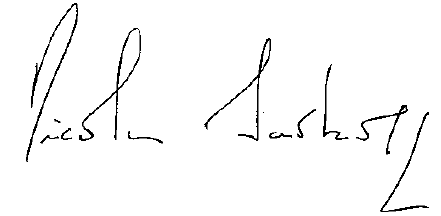The
Energy Policy of French President Nicolas Sarkozy

The text below is a detailed letter sent by Nicolas Sarkozy (President of France, elected 6th May 2007) to EFN (Environmentalists For Nuclear Energy – www.ecolo.org) in response to EFN's letter and questionnaire sent out in April 2006 to each of the candidates then running for the French Presidential election. Nicolas Sarkozy was the most pro-nuclear of the 12 candidates. Independently of any political preferences, his election can be welcomed as good news for the future of nuclear energy in France and in the world. 84% of the French electors voted in this election. Nicolas Sarkozy was elected in the second round of the election by 53% of the voters, against Ségolène Royal, 47%. Nicolas Sarkozy is in favor of both the protection of the environment and nuclear power : he supports energy conservation, renewable energies (to the small extent they can contribute), the EPR (generation 3 reactor), the developement of generation 4 reactors, and the world-wide development of clean nuclear energy (in democratic countries). Action against climate change is for him a "top priority". Nuclear energy will remain a priority for France, as was the case with the previous President, Jacques Chirac. The letter hereafter gives you a more detailed understanding of the energy policy of the new President of France.
Translated from the French original
:
http://www.ecolo.org/elections/presid_07/Presid-07-Sarkozy-AEPN.pdf
18th April 2007,
Mister Bruno Comby, President of EFN (association of Environmentalists For Nuclear Energy),
You have called to my attention to the goals furthered by your organization in the field of ecology and sustainable development. In particular, you insist on the much needed changes to be undertaken in our energy policy, and you especially underline the environmental benefits of nuclear energy.
I thank you for your interest and for writing to me. The defense of the environment has too often in the past been opposed to hunters, farmers, the industries, etc. I can no longer accept this old fashioned and conflictual vision of ecology. It is a paradox to oppose hunters and environmentalists (protectors of nature). There is no ecological logic in thinking that farmers are satisfied of farming pollution, of which they are the first victims. And one really has to hate enterprises to think that they are by nature hostile to environmental protection when, since 20 years, enterprises are perhaps the actors in our society which too the greatest number of initiatives to deal with environmental concerns.
I was particularly glad to read your open and pragmatic letter. I have often mentionned that our action against global warming ought to be one of the priorities of the Government's programme. And in fact, all environmentalists share this view. Nevertheless, for purely ideological reasons, these same environmentalists want to close down our nuclear industry; with the consequences we can imagine on climate change.
I am perfectly aware of the fact that renewable energies, in their present state of development, cannot seriously hope to replace nuclear energy. To replace one single nuclear reactor, one would have to install about a thousand wind turbines (comment added here by EFN : this is true for equal installed capacity, but to produce the same number of kWh, one would need about five thousand wind turbines, not just one thousand). And even then, the production would be irregular. We should obviously continue to support the development of renewable energies; but at least for the medium term they will be nothing more than a rather small contribution to our energy supply. And I can not accept the idea of replacing nuclear power stations by coal or gas. Let me repeat that my priority is to counter climate change.
More exactly, you are asking me the orientations of the energy policy which I would like to see implemented. Let me give you a precise answer.
You know that nuclear energy provides 80% of the electricity in France. That largely explains why France emits 18% less greenhouse gas per inhabitant than the average of the European Union countries. If our nuclear power plants were to be replaced tomorrow by coal plants, our greenhouse gas emissions would rise by 25%. Renewable energies are one solution, but they would not be able to satisfy the entire energy needs of France. We must keep all our options open for replacing our present fleet of nuclear power plants starting about 2015, beginning with the construction of the EPR to come on line in 2012. In terms of safety (prevention of accidents) and for the protection of the environment against waste, it is my position that the EPR reactor represents a great step forward.
It is clear that we must at the same time reassure all our citizens who expect to be better informed about the disposal of nuclear waste and more closely associated with decisions concerning nuclear waste. I propose therefore to create an independent agency which would guarantee that nuclear energy is properly dealt with. This agency would have a "freedom of information" mission, sorting out those documents which can be communicated to the citizens from those which cannot, for obvious reasons of national security.
In any event, taking in consideration the many benefits of this source of energy, I do not contemplate any rapid abandonment of nuclear power. I cannot forget that nuclear energy contributes in a decisive manner to the three objectives of our energy policy as defined in the French law: to guarantee national independence in energy and the security of supply; to take action against the greenhouse effect; and to make sure that the price of electricity remains competitive and stable.
Now to answer your questions about the development of civilian nuclear power world-wide, I am favorable to this development, with the obvious rule that we collaborate only with democratic governments and under strictly administered conditions. This kind of partnership backed by the strength of the French nuclear industry implies to maintain the leadership in this domain of our French nuclear constructor (AREVA) and our French nuclear utility (EDF). The construction of the first EPR reactor will help us keep our leadership.
Concerning your questions about renewable energies, let me assure you that we will accelerate the efforts already under way, and to which France is already engaged, to achieve the European objective of 20% renewables. I contemplate investments aimed at biomass, wind power and solar energy while continuing to encourage geothermal energy. I would like priority to be given to making (these) clean energies available to our fellow citizens. I propose notably that all such "clean installations" be made more accessible by being subject to reduced VAT rate on both material and on installation (comment added here by EFN : the VAT rate in France is 19.6% ; the current situation for encourageing the installation of renewable energies is a tax credit of 50% on the cost of material only, not installation ; it is not clear if this new reduced VAT rate would be additional support added to the existing tax credit or if it would replace it).
Aside from renewable energies (water power, solar, wind, biomass, etc.) for which we should aim for a world leadership comparable to our leadership in nuclear, virtuous individual behaviour and better insulation of old buildings will allow us to make great progress in reducing greenhouse gas emissions in the residential and tertiary sectors.
The figures which you give in this respect are especially revealing. I would repeat that the cleanest energy is that which is not consumed. That's why I propose to go ahead with improved insulation for old housing by creating an environmental income tax credit for such work, and by creating a system of loans at zero interest for that purpose. In the same vein, I promise that our citizens who have such energy saving work done shall be able to recover their upfront cost by the savings on their energy bills.
Finally, you have questioned me about the taxation of CO2 emissions in Europe. Both taxation and the market are powerful tools to modify people's behaviour without restricting innovation – contrary to the making of laws and rules which are less efficient. It (translator's note : a CO2 tax) would allow one to make the polluter pay a fair share for pollution. The environment is a resource. Pollution is a cost. Neither one is much taken into account by the market. Thus it is sometimes more profitable to pollute than to preserve the environment for future generations. So I would like to use tax policy in a virtuous sense, to internalize the external costs now unaccounted for and finally pressing on the environment and the collectivity.
The countries of the EU have preferred a market of emission rights over taxation. I do not want to change that preference. Those countries have chosen to move forward and take the lead in countering greenhouse gas emissions. They should be congratulated.
But I can not accept the idea that European producers making a virtuous contribution to combat climate change, should suffer in the international competition with countries which have decided not to apply the Kyoto Protocol.
I know that the willingness of the countries of the European Union to abide by the Kyoto Protocol, that is to reduce their greenhouse gas emissions by 8% between 2008 and 2012, imposes changes upon their industry which are not supported by other countries, especially the United States, which have not ratified the Kyoto Protocol.
I find that that is an unacceptable inequality of treatment and a distortion of competition, because the quotas of greenhouse gas emissions can legally be considered as a financial charge weighing down on the European industry.
Therefore, I will ask the European Commission to propose an arrangement whereby imported goods shall be submitted to the same requirements of reduced greenhouse gas emissions for their fabrication as in Europe.
I come now to the difficult question of transportation, which you have not raised but which I would like to address. Today our transportation system is 98% dependent on fossil energy. This shows the extent of the task which lies ahead of us. Here again we must develop substitutes to these fossile energies, and in particular biofuels, which on the other hand are also a source of hope for our agriculture. We must invest in research to quickly perfect innovations like the hydrogen fuel cell. We must encourage the French to use their private cars less by developing fast, safe and comfortable public transportation with frequent service; to promote ride sharing (by creating reserved traffic lanes in cities and reduced highway tolls); encourage the use of bicycles (with free bicycles made available to the population in towns, guarded bike parkings, etc.).
In this same spirit, I promise to exempt biofuels entirely from all taxation, and for emissions-free vehicles, to create a blue windscreen sticker authorizing free parking in town, reduced highway tolls, reserved traffic lanes and other advantages to make these vehicles more attractive than standard gasoline-powered vehicles.
I hope I have answered your questions and would be pleased, Mister President of EFN, to hear further from you.
Sincerely yours,

Nicolas Sarkozy
Candidate to the Presidential Election (now President of France).